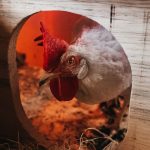Chickens require specific care during winter to maintain their health and well-being. Due to their small size and lack of insulating fur or feathers, chickens are particularly vulnerable to cold temperatures. They are also prone to respiratory issues in cold, damp conditions.
To ensure their survival and comfort, chickens need proper shelter, adequate bedding, sufficient ventilation, supplemental heat sources when necessary, and nutritious food. Access to fresh, unfrozen water is crucial for chickens in winter, as they can become dehydrated despite the cold weather. Regular checks of their water supply are essential to prevent freezing.
Additionally, chickens require space for movement and exercise, even during winter months. Lack of physical activity can lead to health problems such as obesity and reduced egg production. By addressing these specific needs, chicken owners can help their flocks remain healthy and comfortable throughout the winter season.
Proper winter care is vital for maintaining the overall well-being of chickens and ensuring their continued productivity.
Table of Contents
- 1 Providing proper shelter and bedding for chickens
- 2 Ensuring adequate ventilation while keeping chickens warm
- 3 Supplementing with heat sources when necessary
- 4 Offering warm and nutritious food for chickens
- 5 Monitoring the health and behavior of chickens during winter
- 6 Tips for keeping chickens warm and comfortable in cold weather
- 7 FAQs
- 7.1 How can I keep my chickens warm during winter?
- 7.2 What temperature is too cold for chickens?
- 7.3 What should I feed my chickens during winter to keep them warm?
- 7.4 Are there any specific breeds of chickens that are better suited for cold weather?
- 7.5 Should I use a heat lamp in the chicken coop during winter?
Key Takeaways
- Chickens need extra care during winter to stay healthy and comfortable
- Proper shelter and bedding are essential for keeping chickens warm and dry
- Adequate ventilation is crucial to prevent moisture buildup and maintain air quality
- Supplementing with heat sources may be necessary in extreme cold conditions
- Offering warm and nutritious food can help chickens stay healthy and maintain body heat
Providing proper shelter and bedding for chickens
Insulated and Draft-Free Coop
Proper shelter is essential for keeping chickens warm and protected from the elements during the winter. The coop should be well-insulated and free from drafts, with a solid roof to keep out rain and snow. It’s important to regularly check for any leaks or damage to the structure that could compromise its ability to keep the chickens warm and dry.
Comfortable and Clean Bedding
Additionally, providing adequate bedding is crucial for keeping chickens comfortable and warm. Good options for bedding include straw, wood shavings, or shredded paper. The bedding should be kept clean and dry, as damp bedding can lead to health issues such as frostbite and respiratory problems.
Proper Ventilation for Good Air Quality
In addition to providing a warm and dry environment, it’s important to ensure that the coop is well-ventilated to prevent the buildup of moisture and ammonia from chicken droppings. Proper ventilation will help maintain good air quality and reduce the risk of respiratory issues. By providing proper shelter and bedding, you can help your chickens stay warm and comfortable throughout the winter.
Ensuring adequate ventilation while keeping chickens warm

While it’s important to keep chickens warm during the winter, it’s equally important to ensure that their coop is well-ventilated. Proper ventilation is crucial for maintaining good air quality and preventing the buildup of moisture and ammonia from chicken droppings. Without adequate ventilation, chickens are at risk of developing respiratory issues, which can be exacerbated by the cold, damp conditions of winter.
To ensure proper ventilation, consider installing vents or windows that can be opened and closed as needed to regulate airflow. It’s also important to regularly clean the coop to remove any buildup of droppings or bedding that could contribute to poor air quality. In addition to maintaining good air quality, proper ventilation can also help regulate the temperature inside the coop.
By allowing fresh air to circulate, you can prevent the buildup of excess heat or humidity that could lead to discomfort or health issues for the chickens. By balancing the need for warmth with the need for ventilation, you can help your chickens stay healthy and comfortable throughout the winter.
Supplementing with heat sources when necessary
In some cases, supplemental heat sources may be necessary to keep chickens warm during particularly cold spells. This is especially true for young chicks or older chickens, which may be more vulnerable to the cold. Heat sources such as heat lamps or heated pads can be used to provide additional warmth inside the coop.
It’s important to position these heat sources carefully to prevent fire hazards or burns to the chickens. Additionally, it’s crucial to monitor the temperature inside the coop regularly to ensure that it remains within a safe range for the chickens. When using heat sources, it’s important to consider the potential risks and drawbacks.
Heat sources can be a fire hazard if not used properly, and they can also create a dependency on artificial warmth that may make it more difficult for chickens to acclimate to colder temperatures. It’s important to use heat sources judiciously and only when necessary, while also providing opportunities for the chickens to acclimate to natural temperature fluctuations. By supplementing with heat sources when necessary and using them responsibly, you can help your chickens stay warm and healthy throughout the winter.
Offering warm and nutritious food for chickens
During the winter months, it’s important to provide chickens with warm and nutritious food to help them maintain their energy levels and stay warm. Cold weather can increase the energy requirements of chickens as they work harder to stay warm, so it’s important to provide them with plenty of high-quality feed. Consider offering a mix of grains, seeds, and protein-rich foods such as mealworms or black soldier fly larvae to help keep your chickens well-fed and warm.
In addition to providing a balanced diet, you can also offer warm treats such as cooked grains or vegetables to help warm up your chickens from the inside out. Warm water with a splash of apple cider vinegar can also help keep your chickens hydrated and healthy during the winter months. By offering warm and nutritious food, you can help your chickens stay energized and comfortable throughout the winter.
Monitoring the health and behavior of chickens during winter

Monitoring for Signs of Illness
Watch for signs of illness or distress, such as lethargy, decreased appetite, or unusual behavior. Regularly inspect your chickens for signs of frostbite on their combs, wattles, or feet, as well as any signs of respiratory issues like coughing or sneezing.
Observe how your chickens interact with each other and their environment. Are they huddling together for warmth? Are they avoiding certain areas of the coop?
Taking Action for Their Well-being
These observations can provide valuable insights into how your chickens are coping with the cold weather and whether any adjustments need to be made to their environment or care routine. By monitoring the health and behavior of your chickens closely, you can quickly identify any issues and take appropriate action to ensure their well-being throughout the winter.
Tips for keeping chickens warm and comfortable in cold weather
In addition to providing proper shelter, bedding, ventilation, heat sources, and nutritious food for your chickens during the winter, there are several additional tips you can follow to help keep them warm and comfortable: – Provide plenty of space for exercise: Encourage your chickens to move around and exercise by providing ample space in their coop or run. Exercise can help keep them warm and healthy during the winter months.
– Use deep litter method: Consider using the deep litter method in your coop, which involves adding layers of bedding over time to create a natural composting process that generates heat.
– Block drafts: Seal any drafts or gaps in the coop that could let in cold air, but be sure to maintain proper ventilation.
– Use natural sunlight: Position your coop so that it receives plenty of natural sunlight during the day, which can help warm up the interior.
– Consider alternative heating methods: If you’re concerned about using traditional heat sources such as heat lamps, consider alternative methods such as heated perches or solar-powered heaters. By following these tips and providing attentive care for your flock, you can help ensure that your chickens stay warm and comfortable throughout the winter months.
If you’re looking for ways to keep your chickens warm during the winter, you might want to consider converting a shed into a chicken coop. This article from Poultry Wizard provides helpful tips and guidelines on how to effectively convert a shed into a cozy and insulated space for your feathered friends. Check out the article here for more information on creating a warm and comfortable environment for your chickens during the colder months.
FAQs
How can I keep my chickens warm during winter?
To keep your chickens warm during winter, you can provide them with a well-insulated coop, use heat lamps or heated pads, and ensure they have access to plenty of fresh bedding.
What temperature is too cold for chickens?
Chickens can tolerate cold temperatures quite well, but they may start to experience discomfort and health issues if the temperature drops below 0°F (-18°C). It’s important to monitor their behavior and provide additional warmth if necessary.
What should I feed my chickens during winter to keep them warm?
During winter, you can provide your chickens with high-energy feed such as cracked corn or sunflower seeds to help them generate body heat. Additionally, make sure they have access to clean water at all times.
Are there any specific breeds of chickens that are better suited for cold weather?
Yes, some chicken breeds are more cold-hardy than others. Breeds such as the Plymouth Rock, Orpington, and Wyandotte are known for their ability to withstand cold temperatures and are well-suited for winter conditions.
Should I use a heat lamp in the chicken coop during winter?
Using a heat lamp in the chicken coop can provide additional warmth, but it’s important to use it safely to avoid fire hazards. Make sure the heat lamp is securely installed and keep it away from flammable materials. Additionally, provide enough ventilation to prevent moisture buildup.
Meet Walter, the feathered-friend fanatic of Florida! Nestled in the sunshine state, Walter struts through life with his feathered companions, clucking his way to happiness. With a coop that’s fancier than a five-star hotel, he’s the Don Juan of the chicken world. When he’s not teaching his hens to do the cha-cha, you’ll find him in a heated debate with his prized rooster, Sir Clucks-a-Lot. Walter’s poultry passion is no yolk; he’s the sunny-side-up guy you never knew you needed in your flock of friends!







